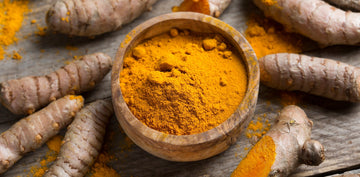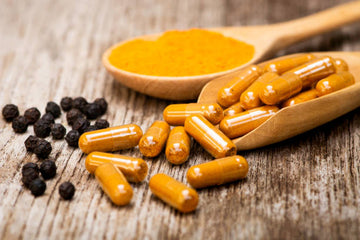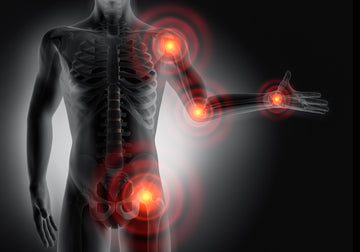When exploring the health benefits of turmeric, you might frequently come across the term "curcumin." While these terms are often used interchangeably, they refer to different things. Understanding the distinction between turmeric and curcumin is essential for making informed decisions about supplements and dietary choices. Here’s what you need to know about turmeric and curcumin.
Are turmeric and curcumin the same?
No. Not exactly.
Turmeric is a bright yellow spice derived from the root of the Curcuma longa plant. It has been used for thousands of years in traditional medicine, particularly in India and Southeast Asia, and is a staple in many culinary dishes, especially curries.
Curcumin is the primary active compound found in turmeric. It is a type of curcuminoid, which are natural phenols responsible for turmeric's yellow color. It is also the component that is most studied for its health benefits, including its potent anti-inflammatory and antioxidant properties. But turmeric also contains other active ingredients like demethoxycurcumin and bisdemethoxycurcumin.

Which should you pick?
“Should you have a choice between turmeric and curcumin, I would opt for the curcumin.” Dr. Elizabeth Ko, an internist and medical director of the UCLA Health Integrative Medicine Collaborative, tells CNBC. But unfortunately, “turmeric only contains a very small percentage of curcumin,” roughly two to six percent. This means that while turmeric contains curcumin, consuming turmeric alone may not provide sufficient amounts of curcumin to achieve the desired therapeutic effects.

How to increase bioavailability?
One of the main challenges with curcumin is its poor bioavailability, meaning it’s not easily absorbed by the body. To combat this, many curcumin supplements include piperine, a compound found in black pepper, which can increase absorption by up to 2,000%. Some supplements use advanced formulations like liposomal curcumin or curcumin nanoparticles to improve bioavailability.
Factors that improve curcumin bioavailability include composition, size, and route of administration of nanoparticles. Curcumin preparations with smaller-size nanoparticles have been found to increase bioavailability when administered orally. In contrast, larger-size nanoparticles have been found to increase bioavailability when administered intravenously.
A review article published in the journal Antioxidants provides a detailed overview of nanoparticle-based strategies to improve the bioavailability and bioactivity of curcumin.
Curcumin nanoformulations can induce senescence in malignant and normal cells, thus effectively treating various cancer types and age-related diseases, including cardiometabolic diseases, neurodegenerative diseases, and liver, lung, and gastrointestinal diseases.
Key takeaway
When it comes to maximizing the health benefits of turmeric, opting for supplements with higher concentrations of curcumin or those enhanced with nanoparticles for improved bioavailability is key. While turmeric itself contains a wealth of beneficial compounds, the small percentage of curcumin it naturally contains may not be sufficient to achieve the desired therapeutic effects.
Curcumin supplements, particularly those formulated with piperine or advanced nanoparticle technology, significantly enhance absorption and effectiveness, ensuring that you reap the full anti-inflammatory and antioxidant benefits. By choosing these enhanced turmeric supplements, you can more effectively support your overall health and well-being.
Reference:
- Turmeric | National Center for Complementary and Integrative Health
- Turmeric and cancer | Cancer Research UK
-
F. Aguilar, B. Dusemund, P. Galtier, J. Gilbert, D.M. Gott, S. Grilli, R. Gürtler, J. König, C. Lambré, J-C. Larsen, J-C. Leblanc, A. Mortensen, D. Parent-Massin, I. Pratt, I.M.C.M. Rietjens, I. Stankovic, P. Tobback, T. Verguieva, R.A. Woutersen |
Scientific Opinion on the re-evaluation of curcumin (E 100) as a food additive







